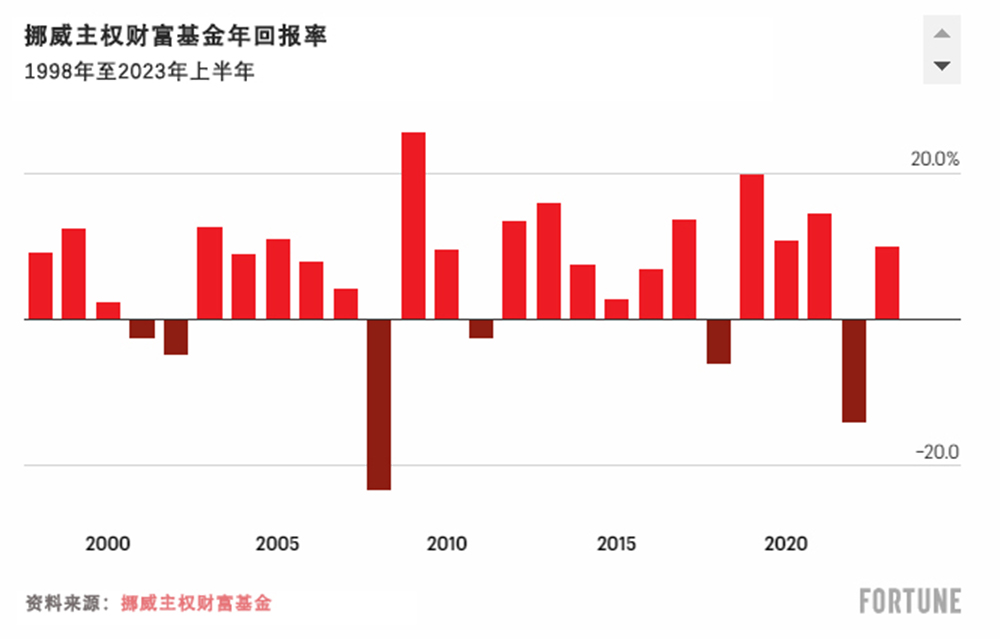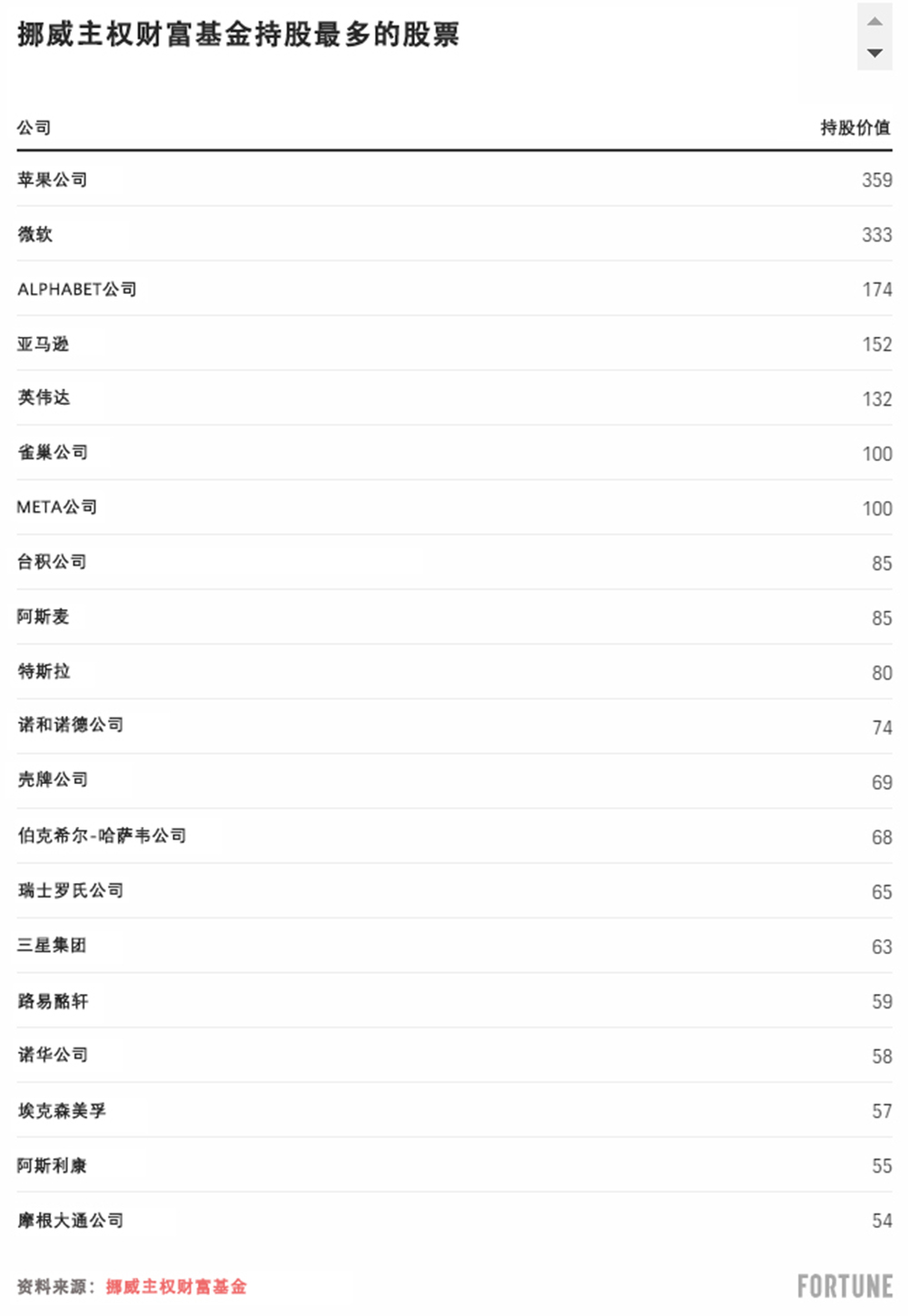
今年上半年,人工智能熱潮推動科技股飆升,給規模達1.4萬億美元的挪威主權財富基金帶來了巨大的提振,使得這家投資巨頭在經歷了有史以來最糟糕的一年之后重新走上正軌。
作為全球股市上最大的單一機構投資者,該基金周三宣布,今年上半年錄得10%的回報,高達15億挪威克朗(1430億美元)。
相比之下,標準普爾500指數(S&P 500)在2023年上半年的回報率約為16%。
今年截至6月30日的六個月里,挪威主權財富基金(管理著挪威來自石油和天然氣資源的財富)股票回報率達近14%,而固定收益資產的回報率僅略高于2%。
不過,由于非上市房地產投資和非上市可再生能源投資分別虧損4.6%和6.5%,該基金的整體回報仍然受挫。
今年上半年末,該基金的估值為153億克朗(1.4萬億美元),其中71%來自股票估值。
據路透社(Reuters)報道,該基金的經濟規模幾乎是挪威經濟的三倍,持有全球約1.5%的股票。
從1998年到2023年6月,該基金的年化回報率略低于6%。
然而,去年(該時期股市受到了自金融危機以來最嚴重的打擊),挪威主權財富基金遭遇了14%的虧損,這是其歷史上第二差的回報,僅次于2008年股市崩盤最嚴重時錄得的23%的虧損。

該基金稱,今年上半年回報率的上升得益于股市的強勁表現,并指出人工智能淘金熱推動了科技股的大漲,而科技股在其投資組合中占了相當大的比例。
截至6月30日,蘋果公司(Apple)是挪威主權財富基金持股最多的股票,微軟(Microsoft)、谷歌(Google)母公司Alphabet、亞馬遜(Amazon)及英偉達(Nvidia)等因專注于生成式人工智能而市值大幅上升的公司則位列該基金股票投資榜的前五名。另外,這一基金還持有Facebook母公司Meta、埃隆·馬斯克的特斯拉(Tesla)及美國銀行業巨頭摩根大通公司(JPMorgan)的大量股份。

而在固定收益資產方面,挪威主權財富基金持有最多的是美國國債,其次是日本、德國和英國政府債券。
周三,挪威央行投資管理公司——挪威主權財富基金的管理機構——首席執行官尼古拉?坦根在一份聲明中表示:“在經歷了2022年的疲軟之后,股市在今年上半年表現十分強勁。科技股錄得了尤其顯著的漲幅,這在很大程度上是因為市場對新的人工智能解決方案的需求增大。”
今年上半年,挪威主權財富基金的科技股回報率為38.6%,非必需消費品股以超過20%回報率成為該基金表現第二佳的成分股。
在另一份關于人工智能的聲明中,該基金表示其認為以負責任的方式開發和利用人工智能技術將對“市場的良好運作至關重要”。
該基金稱:“隨著時間的推移,人工智能可能會影響我們投資的經濟回報。我們支持構建全面且有凝聚力的人工智能監管框架,以促進安全創新和減少不利影響。”(財富中文網)
譯者:中慧言-劉嘉歡
今年上半年,人工智能熱潮推動科技股飆升,給規模達1.4萬億美元的挪威主權財富基金帶來了巨大的提振,使得這家投資巨頭在經歷了有史以來最糟糕的一年之后重新走上正軌。
作為全球股市上最大的單一機構投資者,該基金周三宣布,今年上半年錄得10%的回報,高達15億挪威克朗(1430億美元)。
相比之下,標準普爾500指數(S&P 500)在2023年上半年的回報率約為16%。
今年截至6月30日的六個月里,挪威主權財富基金(管理著挪威來自石油和天然氣資源的財富)股票回報率達近14%,而固定收益資產的回報率僅略高于2%。
不過,由于非上市房地產投資和非上市可再生能源投資分別虧損4.6%和6.5%,該基金的整體回報仍然受挫。
今年上半年末,該基金的估值為153億克朗(1.4萬億美元),其中71%來自股票估值。
據路透社(Reuters)報道,該基金的經濟規模幾乎是挪威經濟的三倍,持有全球約1.5%的股票。
從1998年到2023年6月,該基金的年化回報率略低于6%。
然而,去年(該時期股市受到了自金融危機以來最嚴重的打擊),挪威主權財富基金遭遇了14%的虧損,這是其歷史上第二差的回報,僅次于2008年股市崩盤最嚴重時錄得的23%的虧損。
該基金稱,今年上半年回報率的上升得益于股市的強勁表現,并指出人工智能淘金熱推動了科技股的大漲,而科技股在其投資組合中占了相當大的比例。
截至6月30日,蘋果公司(Apple)是挪威主權財富基金持股最多的股票,微軟(Microsoft)、谷歌(Google)母公司Alphabet、亞馬遜(Amazon)及英偉達(Nvidia)等因專注于生成式人工智能而市值大幅上升的公司則位列該基金股票投資榜的前五名。另外,這一基金還持有Facebook母公司Meta、埃隆·馬斯克的特斯拉(Tesla)及美國銀行業巨頭摩根大通公司(JPMorgan)的大量股份。
而在固定收益資產方面,挪威主權財富基金持有最多的是美國國債,其次是日本、德國和英國政府債券。
周三,挪威央行投資管理公司——挪威主權財富基金的管理機構——首席執行官尼古拉?坦根在一份聲明中表示:“在經歷了2022年的疲軟之后,股市在今年上半年表現十分強勁。科技股錄得了尤其顯著的漲幅,這在很大程度上是因為市場對新的人工智能解決方案的需求增大。”
今年上半年,挪威主權財富基金的科技股回報率為38.6%,非必需消費品股以超過20%回報率成為該基金表現第二佳的成分股。
在另一份關于人工智能的聲明中,該基金表示其認為以負責任的方式開發和利用人工智能技術將對“市場的良好運作至關重要”。
該基金稱:“隨著時間的推移,人工智能可能會影響我們投資的經濟回報。我們支持構建全面且有凝聚力的人工智能監管框架,以促進安全創新和減少不利影響。”(財富中文網)
譯者:中慧言-劉嘉歡
Norway’s $1.4 trillion sovereign wealth fund saw a huge boost from the A.I.-driven tech surge in the first six months of this year, putting the investment titan back on track after one of its worst years ever.
The fund—the world’s biggest single investor in the stock market—announced on Wednesday that it had achieved a 10% return for the first half of the year, amounting to 1.5 billion Norwegian kroner ($143 billion).
In comparison, the S&P 500 logged a return of around 16% in the first half of 2023.
The Norwegian sovereign wealth fund, which manages the wealth derived from Norway’s oil and gas resources, gained almost 14% from its stock holdings in the six months to June 30, with its fixed income assets returnng just over 2%.
The fund’s return was stunted, however, by a 4.6% loss on unlisted real estate investments and a 6.5% loss on unlisted renewable energy investments.
By the end of the first half of the year, the fund was valued at 15.3 billion kroner ($1.4 trillion), with 71% of that value coming from equities.
According to news agency Reuters, the fund, which is almost three times the size of Norway’s economy, owns around 1.5% of the world’s stocks.
Between 1998 and June 2023, the fund generated an annualized return of just under 6%.
However, last year—which saw stocks take their worst battering since the financial crisis—Norway’s wealth fund suffered a 14% loss, the second-worst return in its history after a 23% loss at the height of the 2008 crash.
The fund cited a strong equity market for its boosted returns for the first six months of the year, noting that the A.I. gold rush had driven a boom in tech stocks—which make up a sizable proportion of its portfolio.
Apple was the fund’s biggest equity holding by June 30, while Microsoft, Google parent firm Alphabet, Amazon, and Nvidia—all of which have seen their market caps boosted by their focus on generative A.I.—rounded out the fund’s top five stock investments. It also held large stakes in Facebook parent Meta, Elon Musk’s Tesla, and U.S. banking giant JPMorgan.
Meanwhile, its biggest fixed-income holdings were U.S. Treasuries, followed by Japanese, German, and U.K. government bonds.
“The stock market has been very strong in the first half of the year, following a weak year in 2022,” Nicolai Tangen, CEO of Norges Bank Investment Management—which manages the fund—said in a statement on Wednesday. “Technology stocks especially have seen significant growth, largely driven by the increased demand for new solutions in artificial intelligence.”
Tech stocks returned 38.6% for the fund in the first half, with consumer discretionary stocks coming in as the fund’s second-strongest holdings with a return of more than 20%.
In a separate statement on A.I., the fund said it believed the responsible development and use of the technology will be “important for well-functioning markets.”
“[It] has the potential to affect the financial return on our investments over time,” it said. “We support the development of a comprehensive and cohesive regulatory framework for A.I. that facilitates safe innovation and mitigation of adverse impacts.”






